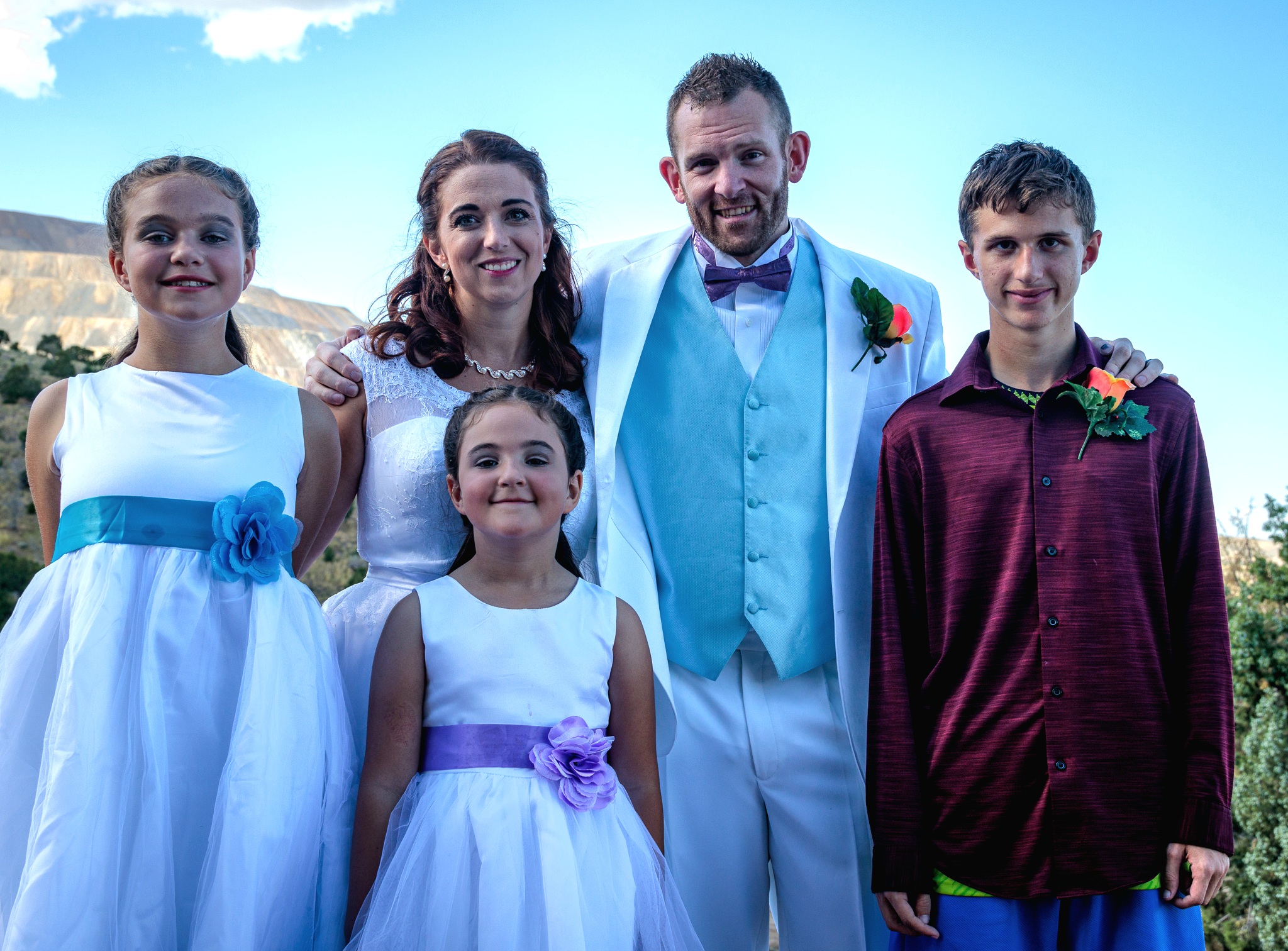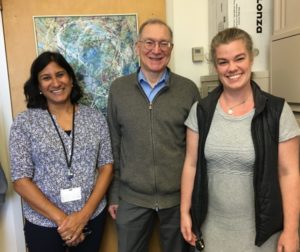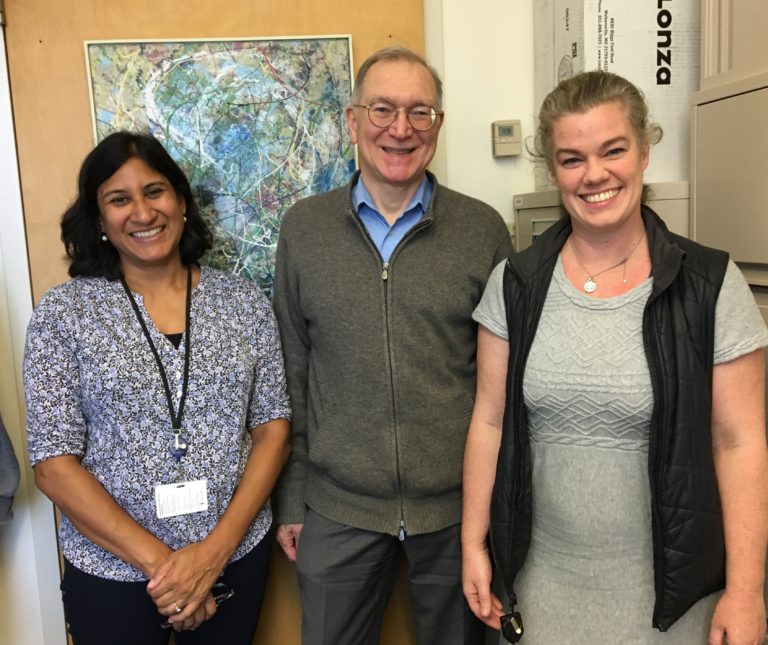
Amanda hopes her cancer journey is a positive example for her kids
April 22, 2024
This is a guest post by Amanda Reitz, a mother of three children who were 13, 9, and 5 years…
Read More
Led by Dr. Kathleen Mahoney in collaboration with Dr. Rupal Bhatt, both clinicians and scientists, and Dr. Gordon Freeman, a virologist and immunologist who contributed critical work to the discovery of the PD-1/PD-L1 pathway, this research team from the Dana-Farber Cancer Institute and Beth Israel-Deaconess Medical Center in Boston, Massachusetts received a 2019 Advanced Discovery Award.
Their research will explore a novel immune checkpoint pathway – HHLA2/KIR3DL3 – that is similar to but distinct from the PD-1/PD-L1 checkpoint pathway, which has been a key driver of advances in immunotherapy that led to much improved outcomes for many patients with cancer. The team proposed that a better understanding of how the HHLA2/KIR3DL3 pathway works and determining if disrupting it allows immune cells target and destroy cancer cells could be important for patients with metastatic renal cell carcinoma (RCC) who might not benefit from existing immunotherapies.
We spoke with Dr. Mahoney, Dr. Bhatt, and Dr. Freeman about their work and the potential impact for patients.

Gordon Freeman: The whole idea of cancer immunotherapy is the cancer is turning off the immune system. [Immunotherapy] works in maybe 30% of kidney cancer patients. That means it’s not working in 70%. So, the big effort now is how do you bring benefit to those 70%. Part of it involves figuring out why [targeting] PD-1 isn’t working. One possible mechanism is that there’s another way the tumor is evading immune response. And we think this [HHLA2/KIR3DL3] pathway is another way the cancer can turn off the immune cells, so if you block it, you help those patients.
Rupal Bhatt: Our project focuses on the identification of a potential new immune therapy for kidney cancer. While the field of kidney cancer has had some great advances, including approval of several VEGF-targeted agents and then proof of concept of immunotherapy with PD-1 blockade, and more recently the combination thereof, we’ve been interested in novel immune targets and ways to combat resistance.
The application to kidney cancer is especially interesting because we found HHLA2 is pretty highly expressed in the majority of kidney cancers we’ve looked at. It seems to have a distinct expression from PD-L1, so it’s possible that patients who express HHLA2 may benefit more from that line of therapy than from PD-L1 therapy, although that is something we hope to understand more in the future.
Kathleen Mahoney: Potentially, this is a pathway that will either be a mechanism of resistance to PD-1 therapy or, as some of our preliminary data shows, it may be an alternate immune checkpoint pathway and by blocking it we can allow cells to reactivate and attack the tumor.
In kidney cancer, the field is rapidly shifting and how patients are treated is rapidly shifting. Surgery still has a very important role for curative purposes… the role of immunotherapy is for reducing the risk after therapy. But different patients need different treatments and the goal is, if the disease is curable, go for the most likely cure. In other cancers, the greatest cure rate is in multimodal [treatment].
RB: If we are successful and we do find a new treatment for kidney cancer, we’d love for the kidney cancer community to help us develop it, we’d need the support of other clinicians and patients. It’s on us to figure out what the best therapeutic is. It’s on us and our colleagues in the community to decide in what settings it’s best used, what patients could benefit the most, and when along their therapy would they benefit. Those are future goals.
RB: We have such curious patients who are always wondering what’s next, what’s new, what’s on the horizon. It’s a testament to them that it’s not often about what’s in it for them but what’s out there for the community. Some therapies that are in development might not benefit every patient who is actively being treated but in the future could hold treatments either for the patients themselves or future patients.
RB: This has been a big project in the making, about two years. We have a large consortium – a renal SPORE* – where we give talks and we have a community to hear what everybody is working on. Between the funding and the seminars SPORE has afforded us, it allows us to connect and follow up.
We’re a team of a kidney cancer physician, a clinician scientist, and a world expert in immunology… it’s been a really fun collaboration.
KM: Dr. Freeman’s basic research is a testament to how basic research can translate to patient outcomes. With this team, we’re well set up to try to validate this pathway and help translate it as quickly as possible to help patients as soon as we can.
KM: I love taking care of patients and having that connection and intimacy to help them through this difficult time in their lives. I love the process and curiosity of research. I was fortunate enough in my fellowship to be introduced to the efficacy and potency of immunotherapy. One of the reasons I’ve devoted the second half of my research career education to immunotherapy is because you can see these durable benefits and remissions that we’ve never seen before.
RB: I love asking scientific questions and I’ve been passionate about kidney cancer for over a decade. I’m not classically trained as an immunologist so this is my opportunity to help kidney cancer patients, do more science, keep a lab going, and collaborate with world experts in immunology.
GF: In my family, cancer kills people. And stopping cancer from killing people is the goal. My other daily pleasure is solving puzzles. Science is the investigation of the unknown. It requires a certain amount of perseverance and confidence and exploration. Solving puzzles is fun. And if you can solve puzzles and help people, boy, you’ve got a win-win situation.
*The Dana-Farber/Harvard Cancer Center Kidney Cancer Specialized Program of Research Excellence (SPORE) is a collaborative research consortium program.